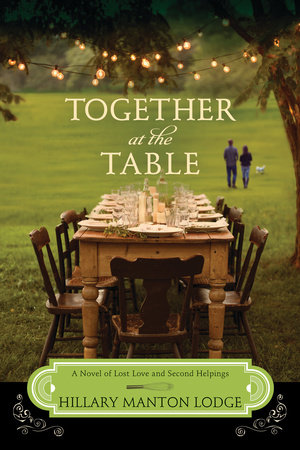Excerpt
A Table by the Window
Life is a combination of magic and pasta.
—Federico Fellini
I can’t believe she left you the prep table,” my brother Nico groused as he and my oldest brother, Alex, carried the piece up the stairs to my apartment. “That’s a solid French oak cutting service. And that wood inlay? It’s unbelievable work. Nice and tall too. Don’t have to stoop. I hate that—chopping vegetables and getting a crick in my back. Too young for that. Great storage for knives and tools beneath. They don’t make them like this anymore.”
“Have you noticed that Nico hasn’t said anything about the cameo and pearls?” I asked Alex with a wink.
Alex winked back, adjusting his grip on the table to keep it level.
“Really, Juliette”—Nico fixed me with his sincerest expression—“I’d buy it from you. I’m serious.”
“I’m serious about keeping it,” I said, keeping my voice light. My second oldest brother was nothing if not stubborn. “Be careful around that corner.”
One last step. “But it’s the perfect prep table!”
“I know it’s the perfect prep table.” I held the door open while my brothers carried the piece inside. “That’s why I want to keep it. Watch the back left corner; it’s awfully close to the railing.”
I breathed a sigh of relief once the table touched down in my kitchen without injuries.
“But I’m a chef !” my brother beseeched, splaying his hands in old-school Italian style. “I was nominated for a James Beard award—I chop more than you do!”
“First,” I began, wishing for a moment that I wasn’t dealing with the piquant blend that was our father’s Italian persistence and our French mother’s stubbornness, “I don’t think anyone’s going to forget about your nomination anytime soon. Second, I’m not going to argue with you about who chops more,” I said, trying to keep my frustration at bay. “I like the table. Grand-mère willed me the table. I’m not going to argue with our grandmother’s last wishes. C’est la vie.”
Nico muttered something unflattering in Italian. Alex and I exchanged glances.
I breathed deep to keep my emotions in check. “I have homemade ice cream in my freezer,” I said. “I used my Tahitian vanilla beans. And I still have the lavender caramel sauce I made last week.”
As I suspected, my more tempestuous brother thawed by the time I served up the ice cream, complete with caramel sauce and a shortbread cookie for kicks.
My brothers are notoriously easy to placate.
“I’m sorry I was…insensitive about the table,” Nico said around a bite of cookie. “I like the table. But you should have it. You were Grand-mère’s favorite anyway.”
“No, I wasn’t,” I protested, then took a bite of ice cream myself. “I just saw her more because I worked the register at the patisserie all through high school.”
“You were also the one she taught her pastry secrets to,” Alex pointed out. “But that’s all right.”
I shook my head. “She loved all of us. I know she did. I can’t…I can’t believe she’s gone.”
Nico lifted his spoon. “This is her ice cream recipe, isn’t it?”
“Of course.”
“She’d like that.” He flipped the spoon over, consumed the contents, and held out the empty utensil. “Salute!”
“Salute,” Alex and I echoed, clinking spoons together out of respect for ice cream and ice cream makers, past and present.
I gave the prep table a more thorough inspection after my brothers left. It had been in Grand-mère’s kitchen for as long as I could remember; I used to perch beneath it as a child.
Having it in my own kitchen was bittersweet and unsettling all at once. I could be jocular with my brothers about it, but on the inside I was still heartsick from the loss. Two months had passed since she had succumbed to a stroke. Most of the grief had subsided, but a familiar ache had taken residence in my heart.
While Grand-mère had certainly been getting on in years, her death took my family by surprise. Though her estate had always been well organized legally, none of us were emotionally prepared to deal with what she had left behind: a small but profitable bakery, the apartment above, and an extraordinarily fluffy bichon frise named Gigi.
The bakery had closed and its employees quickly hired elsewhere—no one trained pastry chefs like Grand-mère. Gigi now resided with my parents, and the prep table resided with me. I redirected my focus to the table. The cutting board was four inches thick, with a spacious three-by-four-foot work surface. Half of it was oak, the other half an inset slab of marble, perfect for making pastry or candy.
After our grand-père passed away in 1976, Grand-mère left France and moved to Portland to be near my parents—they had, after all, created Sophie, the first grandchild. But rather than live out her golden years wrapped up in the lives of her offspring, Grand-mère opened a bakery—La Petite Chouquette—in an old house on the edge of Portland’s Pearl District. The name of the bakery roughly translated to “The Little Pastry Puff,” in reference to the small, round pastries that were used in profiteroles and croquembouches.
I knew the prep table was one of the pieces Grand-mère had brought from France. She’d used it in her apartment kitchen—I remembered her rolling out slab after slab of pâte brisée over its surface.
There were two drawers beneath the cutting board on either side of the table; strong legs curved into a flat base with two more deep drawers. Casters on the bottom allowed the table to roll, though it took effort. The piece was very, very heavy.
For a moment, I felt guilty for keeping the table. After all, I was the sibling who went to culinary school, got scared off by the realities of a commercial kitchen where I wasn’t related to half of the staff, and hightailed it into restaurant management before migrating into food writing. I certainly spent a fair amount of time in the kitchen, but Nico was right—he cooked more.
But I remembered Grand-mère teaching me to use a chef’s knife, how many turns to give croissant dough for maximum flakiness, how to pipe a crème anglaise filling into a chouquette. No, there were too many memories, too many afternoons spent bent over that table for me to be able to part with it. Besides, Nico had inherited Grand-mère’s Alsatian earthenware, as well as her copper cookware.
I pulled my thoughts away from my brother and back toward the table. The drawers were still full; inside, I found an egg timer shaped like the Arc de Triomphe, a wooden-handled French herb chopper, an assortment of keys, embroidered tea towels, cheesecloths, and a set of seven linen napkins, yellowed but intact.
So many memories.
The last drawer, however, stuck when I tried to pull it open, no matter how hard I tugged at the faceted glass knob. Curiosity got the better of me, so I reached for my metal spatula and wedged it with care into the crevices around the drawer, loosening whatever age and dust held it in place. With another sharp yank, the drawer released instantly, nearly clattering to the floor. Inside there was a thin blue cookbook, written in French, and thirty or so recipe cards scattered at the bottom of the drawer.
The book I instantly recognized as Grand-mère’s favorite—the one she referred to when she couldn’t remember an ingredient or measurement from a classic recipe. I cast a longing glance at the cards. There wasn’t time to look at them, not really. Not with the two articles for the newspaper I had due. The recipes would wait. Lunch break over, I gathered my things and readied myself to get back to work, grabbing at the last moment the choker-length strand of Grand-mère’s pearls from my dresser.
With her table in my kitchen and pearls against my skin, she felt just a little bit closer than before.






